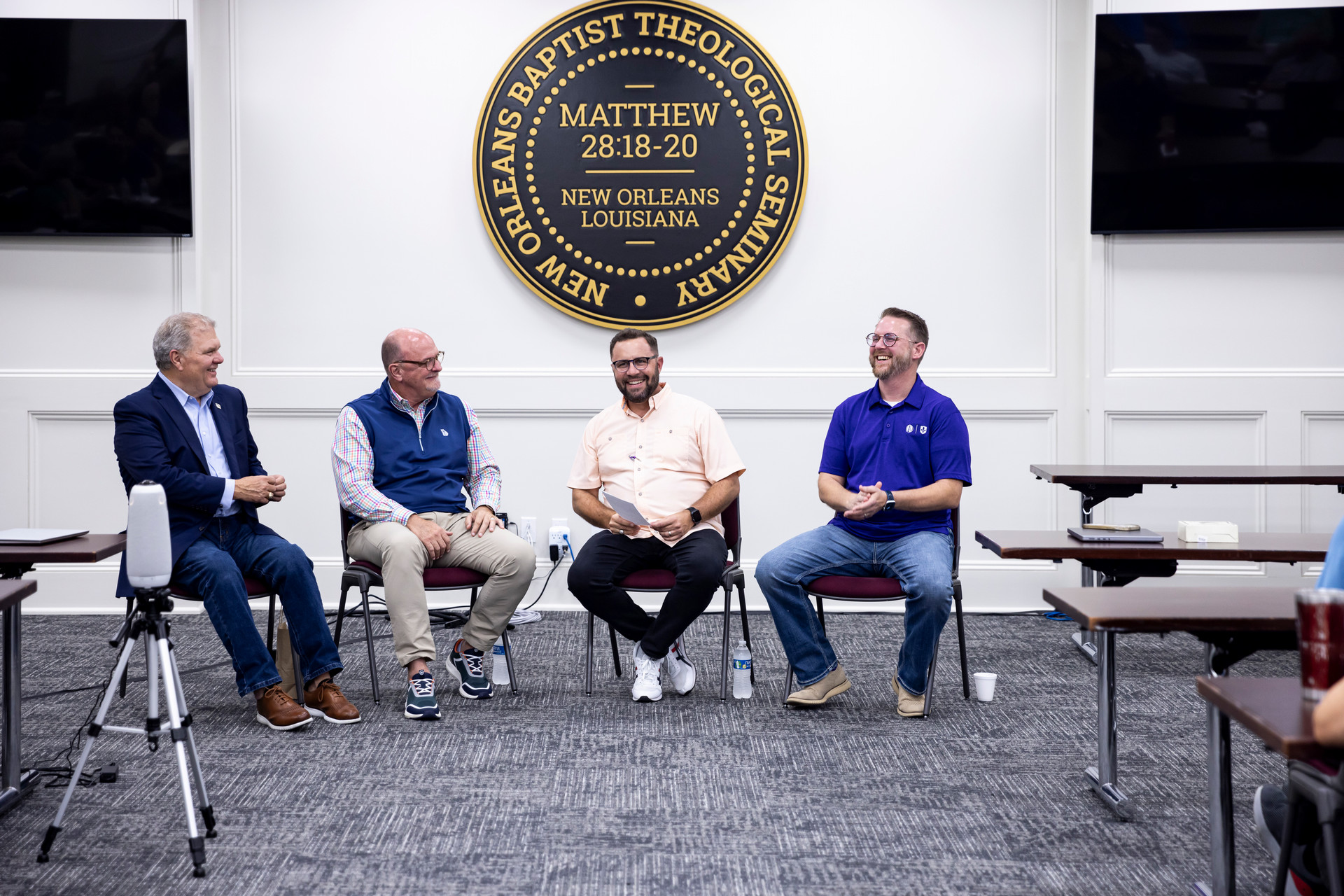
New Orleans Baptist Theological Seminary and Leavell College faculty heard from a group of state convention executive directors during their fall workshop on Friday, Aug. 2.
The executive directors shared about ministry needs they see throughout their particular convention, and how NOBTS can help partner with them to meet these needs.
The group included Randy Davis, executive director of the Tennessee Baptist Mission Board; Thomas Hammond, executive director of the Georgia Baptist Mission Board and Tony Wolfe, executive director-treasurer of the South Carolina Baptist Convention.
Jamie Dew, president of NOBTS and Leavell College, began the session by expressing deep gratitude for the work of the visiting executive directors.
“These men are fantastic,” Dew said. “They’ve been faithful partners. They are doing their work faithfully in their respective state.
“At the end of the day, these are the best of the best of Southern Baptists. They’re humble, they’re hard-working, they’re faithful to Jesus, they love Him deeply and they do what they do to help advance the greater cause that all of us are a part of. I think they have one of the hardest jobs in the SBC. It’s helpful for us to have people come in and help us see something that we may not have the opportunity to see.”
Much of the conversation centered around the great need for pastors and church leaders in the trio’s respective conventions.
Davis said a recent survey of several hundred Tennesse pastors clearly demonstrated this dilemma.
“The greatest need that rose to the surface (in the survey) was the ministry pipeline being empty,” Davis said.
“We’ve got four or five hundred churches that have no pastor ... it’s a crisis in Tennessee.”
Hammond echoed these sentiments about a depleted ministry pipeline.
“It’s not just that there’s a difficulty in finding a pastor, it goes beyond that,” Hammond said. “To your point, the pipeline is significantly drying up.”
He said Georgia Baptists recently began an initiative to combat this shortage, and results are slowing beginning to show.
“A few years ago we did a major initiative called ‘Calling out the Called,’ and we actually shifted a lot of our resources to do this. We raised the bar at all of our camps and all of our gatherings of any middle school, high school or college students. We’re just now starting to see the pipeline kind of refill. Over the last three years I would say we have several hundred that have indicated at some level that they feel a call or some type of call into ministry and they’re pursuing it.”
Wolfe described a similar reality in South Carolina, saying there are nearly 200 churches in the South Carolina Baptist Convention looking for a pastor at any given time.
Yet, he explained this lack of ministry leaders could be seen as an effect rather than a cause.
“When churches find out you’re a seminary professor, they ask you, ‘why aren’t you producing more pastors?’” Wolfe said.
“The truth is you can only train the people that the church is sending you ... As state execs, we also can only get people in our pipelines that come from the churches. Really, I feel like what we’re missing here is an ethos of reproduction from pastors in local churches.”
Wolfe challenged the faculty to continue to help communicate and teach the ministry values of multiplication and discipleship to their students.
“One thing as seminary professors that you guys can do in every field ... if we’re not creating and facilitating an ethos of reproduction in ministry, I think we’re measuring the wrong things. The win is going to be in reproduction always. I think we, meaning all of us, have to work at recreating an ethos of reproduction.”
Davis, an NOBTS alum, said although there remains a need for more pastors, he is very encouraged by ministry training he sees happening throughout the SBC, including at NOBTS.
“I think we’re on the very front lines of a wave of people that are being called into ministry,” Davis said.
“I’m not discouraged about the empty pipeline, I’m very encouraged by what I see happening. As a graduate of New Orleans, I just want to say how proud I am and how thankful I am about where my alma mater is right now. I praise the Lord for you.”